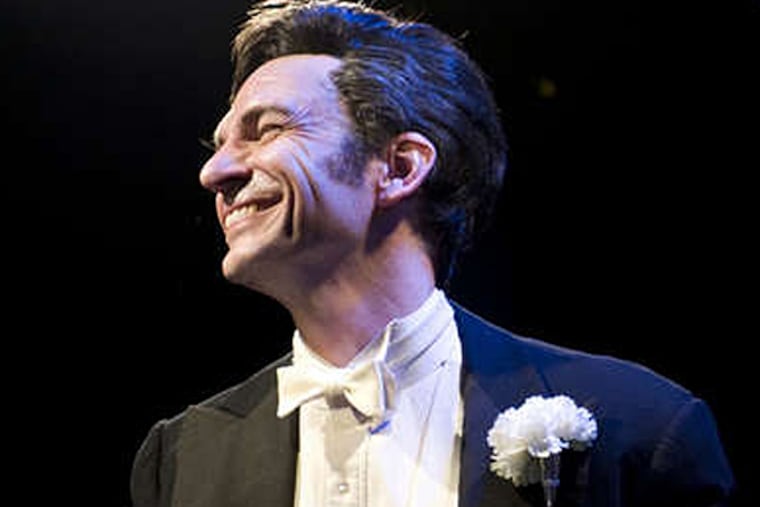'Liberace!' seeks the man behind the candelabra
Say the name "Liberace" and a dozen smiling images - each campier than the one before - pop into view, all fabulous, rhinestone-encrusted, fur-lined, and sprinkled with stardust.

Say the name "Liberace" and a dozen smiling images - each campier than the one before - pop into view, all fabulous, rhinestone-encrusted, fur-lined, and sprinkled with stardust.
When he was part of the entertainment landscape from the 1950s through the 1980s on television or stage, Liberace's keyboard repertoire was one of showy pop/classical sides and willowy, winking conversational asides.
And he was beloved, particularly by women, his sexuality rarely questioned (he won libel suits against Britain's Daily Mirror and Confidential magazine in the mid-'50s when they implied he was homosexual) until the dawn of the raging '80s when his ex-chauffeur sued the piano man for palimony. Even when dying of AIDS-related complications in 1987, Liberace never admitted to being anything but sensational. It took the chauffeur-turned-boy-toy's memoir, Behind the Candelabra, and its 2013 Steven Soderbergh-directed HBO film (with Michael Douglas as a relentlessly druggy and sexed-up Liberace) to tarnish the sequins.
"The Michael Douglas film made Liberace seem elusive and ugly," says Bernard Havard, president and producing artistic director of the Walnut Street Theatre. "I wanted to see something closer to the Liberace I grew up with, the fun Beau Brummell without the dirt and the tragedy."
That's most certainly part of the reason that Havard booked the one-man Liberace! - written and directed by Brent Hazelton and starring pianist/actor Jack Forbes Wilson - into the Walnut's Independence Studio on 3, where it will run through April 12.
With his coiffed mop of hair, lamé-based costumes, and his grand piano, Wilson will do the glamorous Liberace with teasing ease. But Wilson, a Wisconsin native, also portrays the simpler Wladziu Valentino Liberace, the Milwaukee-born child prodigy destined for classical-music greatness until he discovered glitz.
"I had to have the instrumental chops and the bubbly personality to pull it off," says Wilson, who also started his career as a classical musician, earning a masters in piano at the University of Wisconsin.
He acted in Shakespeare plays, did musical theater, and was a natural to be considered for Milwaukee Rep's premiere production of Liberace! in 2010 - "until I said 'no' three times," says Wilson of his reluctance to play the kitsch icon, who was never taken seriously by critics. "I knew he was a good pianist but honestly thought that the glitter and the feathers camouflaged what he couldn't do, that he probably wasn't better than average."
But conversations with members of the Milwaukee Symphony, with which Liberace had played, convinced Wilson otherwise - that this was a phenomenal, dynamic pianist who knew the classics inside-out and was greatly loved by his orchestral brethren.
"He merely chose to make it all showy, so from there the challenge became to play up to that standard while finding the character," says Wilson, who didn't want to imitate Liberace's gossamer speaking voice or mannerisms.
He wanted to find the everyday guy "behind the candelabra," he says, noting that in appearances by Liberace ("whose voice was lower in conversation") with Johnny Carson on The Tonight Show, the two Midwesterners "seem like a couple of regular Middle Americans who could have had beers after work."
Wilson and playwright/director Hazelton also wanted to deal with the interior struggle that Liberace, "a near-mythological creature," had to deal with: how to tell a dishonest story honestly.
"Though he never admitted it during his lifetime, Liberace knew what he was, that he was gay," says Wilson, who speaks directly to the audience as a visitor from the afterlife. "That's nice, you know - the confrontation with the real truth comes after his death."
The seediness of drugs and the giddiness of random sex are things that neither Wilson nor Hazelton plays up. "The audience can fill that in," says Wilson. "It's not a dark confessional."
In the end, after all the over-the-top glitter has played out, Wilson portrays Liberace as good old Walter: "He's two people. I have to be both and make it look seamless."
It is intense, documentary-like one-person biographical plays that the Walnut's Havard loves most. "I don't read fiction, because I'm too busy making make-believe," he says of his fondness for all things nonfiction. As a result, he's booked many one-person shows events into the Walnut, especially its intimate Independence black-box space.
"The economics is one driving factor, as they're cheaper to mount," says Havard of shows about Groucho Marx, Ethel Waters, Dean Martin, and Sophie Tucker. "Will Stutts has done a number of single-performer shows for us," he says of the one-man-band actor who has portrayed Frank Lloyd Wright, Noel Coward, Walt Whitman, Edgar Allen Poe, John Barrymore - and even Tallulah Bankhead (who happened to be Stutts' cousin).
"My love of and belief in actors is a big part of hosting many one-man biographies," Havard says. "It's actors who basically control their own situations after the director has left. An actor by himself on stage - when he's great - is just the most amazing achievement"
THEATER
Liberace!
Through April 12 at the Walnut Street Theatre's Independence Studio on 3.
Tickets: $36.50.
Information: 215-574-3550 or www.walnutstreettheatre.orgEndText